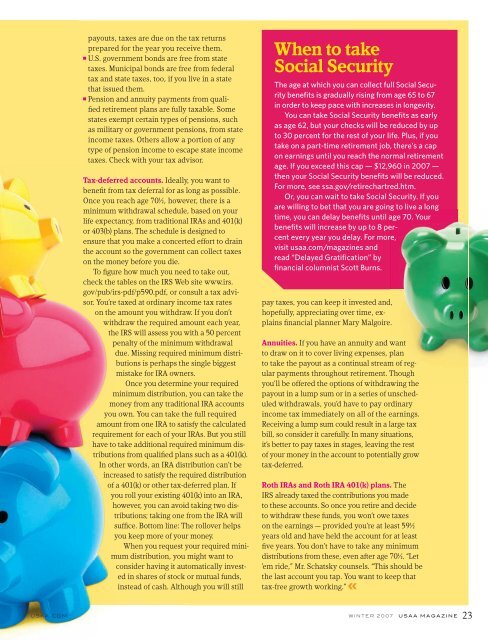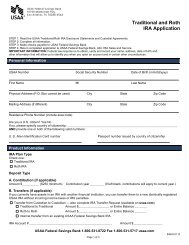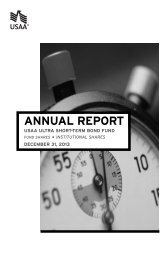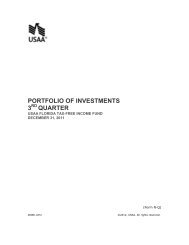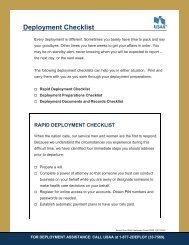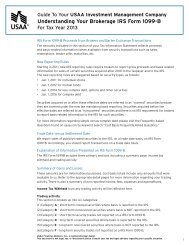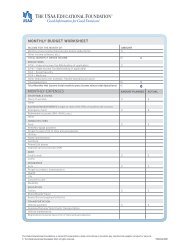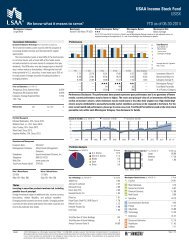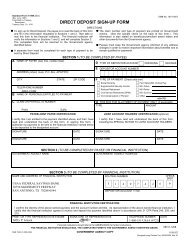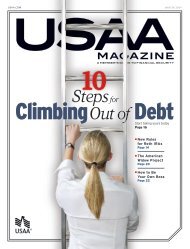USAA Magazine Fall 2006
USAA Magazine Fall 2006
USAA Magazine Fall 2006
- No tags were found...
You also want an ePaper? Increase the reach of your titles
YUMPU automatically turns print PDFs into web optimized ePapers that Google loves.
PHOTOGRAPH BY XXXXXXXXXXXXpayouts, taxes are due on the tax returnsprepared for the year you receive them.■ U.S. government bonds are free from statetaxes. Municipal bonds are free from federaltax and state taxes, too, if you live in a statethat issued them.■ Pension and annuity payments from qualifiedretirement plans are fully taxable. Somestates exempt certain types of pensions, suchas military or government pensions, from stateincome taxes. Others allow a portion of anytype of pension income to escape state incometaxes. Check with your tax advisor.Tax-deferred accounts. Ideally, you want tobenefit from tax deferral for as long as possible.Once you reach age 70½, however, there is aminimum withdrawal schedule, based on yourlife expectancy, from traditional IRAs and 401(k)or 403(b) plans. The schedule is designed toensure that you make a concerted effort to drainthe account so the government can collect taxeson the money before you die.To figure how much you need to take out,check the tables on the IRS Web site www.irs.gov/pub/irs-pdf/p590.pdf, or consult a tax advisor.You’re taxed at ordinary income tax rateson the amount you withdraw. If you don’twithdraw the required amount each year,the IRS will assess you with a 50 percentpenalty of the minimum withdrawaldue. Missing required minimum distributionsis perhaps the single biggestmistake for IRA owners.Once you determine your requiredminimum distribution, you can take themoney from any traditional IRA accountsyou own. You can take the full requiredamount from one IRA to satisfy the calculatedrequirement for each of your IRAs. But you stillhave to take additional required minimum distributionsfrom qualified plans such as a 401(k).In other words, an IRA distribution can’t beincreased to satisfy the required distributionof a 401(k) or other tax-deferred plan. Ifyou roll your existing 401(k) into an IRA,however, you can avoid taking two distributions;taking one from the IRA willsuffice. Bottom line: The rollover helpsyou keep more of your money.When you request your required minimumdistribution, you might want toconsider having it automatically investedin shares of stock or mutual funds,instead of cash. Although you will stillWhen to takeSocial SecurityThe age at which you can collect full Social Securitybenefits is gradually rising from age 65 to 67in order to keep pace with increases in longevity.You can take Social Security benefits as earlyas age 62, but your checks will be reduced by upto 30 percent for the rest of your life. Plus, if youtake on a part-time retirement job, there’s a capon earnings until you reach the normal retirementage. If you exceed this cap — $12,960 in 2007 —then your Social Security benefits will be reduced.For more, see ssa.gov/retirechartred.htm.Or, you can wait to take Social Security. If youare willing to bet that you are going to live a longtime, you can delay benefits until age 70. Yourbenefits will increase by up to 8 percentevery year you delay. For more,visit usaa.com/magazines andread “Delayed Gratification” byfinancial columnist Scott Burns.pay taxes, you can keep it invested and,hopefully, appreciating over time, explainsfinancial planner Mary Malgoire.Annuities. If you have an annuity and wantto draw on it to cover living expenses, planto take the payout as a continual stream of regularpayments throughout retirement. Thoughyou’ll be offered the options of withdrawing thepayout in a lump sum or in a series of unscheduledwithdrawals, you’d have to pay ordinaryincome tax immediately on all of the earnings.Receiving a lump sum could result in a large taxbill, so consider it carefully. In many situations,it’s better to pay taxes in stages, leaving the restof your money in the account to potentially growtax-deferred.Roth IRAs and Roth IRA 401(k) plans. TheIRS already taxed the contributions you madeto these accounts. So once you retire and decideto withdraw these funds, you won’t owe taxeson the earnings — provided you’re at least 59½years old and have held the account for at leastfive years. You don’t have to take any minimumdistributions from these, even after age 70½. “Let’em ride,” Mr. Schatsky counsels. “This should bethe last account you tap. You want to keep thattax-free growth working.”<strong>USAA</strong>.COM WINTER 2007 <strong>USAA</strong> MAGAZINE23


